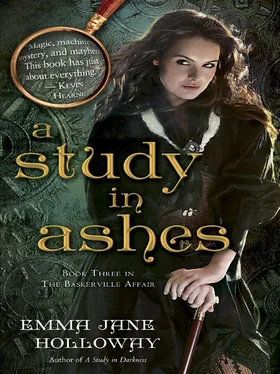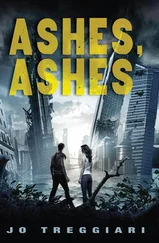“Are you joining us?” he asked Holmes when it became clear that was exactly what was about to happen.
“I invited him.” The Schoolmaster flashed an apologetic grin. “He promised to advise me on the menu.”
“I advised him against it altogether,” Holmes said dryly, “but he insisted on sampling la crème brûlée à la vanille for himself. Youth these days are fascinated by direct experience. None of this business of truth strained through the careful sieves of their advisors. Terribly gauche, don’t you think?”
“I think it’s unnecessary exposure,” Bancroft snapped.
The young man shrugged. “No one here would know me from one of the pot boys. All my friends are in the taverns.”
He was probably right. Although most had heard of the Schoolmaster, few had seen his face. Boxing up his temper, Bancroft waved toward the array of food on the table—mostly cheeses, cold meats, a lobster pâté, and warm bread. “Then help yourself. Would you like something more substantial? A roast chicken, perhaps? Or your crème brûlée ?”
“No, thank you. This is more than enough.”
“Some wine?”
The Schoolmaster pulled off his green-tinted glasses, revealing intelligent blue eyes. There were lines around them that said he was a little older than Bancroft had first thought. Those blue eyes studied him shrewdly. “But you don’t drink.”
“No.” Not anymore, and it still cost him something to say it.
“Then I will just have coffee.”
“Holmes?” Bancroft eyed the man, who waved away the offer.
Relieved, Bancroft signaled the waiter. He’d sworn off alcohol, but he still craved it. In the meantime, the Schoolmaster helped himself, spreading a chunk of bread with a soft white cheese. Bancroft eyed him. His manners were good; whoever the Schoolmaster was, he’d been raised by gentry. “I confess that I expected Mycroft Holmes.”
“This is my brother’s favorite eatery,” Sherlock replied. “But on a Monday he won’t make his appearance until half past two precisely. He is a creature of strict habits.”
“And after all the support you’ve given our cause,” the Schoolmaster added, “I wish to thank you myself on behalf of the makers. Your generosity is most impressive.”
Despite his innate cynicism, Bancroft felt a surge of pleasure. “There is no need to thank someone for doing what is right.”
As Holmes gave a faint cough, the Schoolmaster cocked an eyebrow. “And yet people seem to like it.”
Bancroft chuckled. “I concede the point.” It was true, he’d given money to the rebel cause—sometimes more than he could afford. Patriotism played a role, but so did ambition. If the rebels overthrew the Steam Council, his political career would be made. He hoped generosity now would pay huge dividends later—and he didn’t care if bounders like Sherlock Holmes called such motives crass. A man had to provide for his future.
Still, there were obstacles. Bancroft shifted uneasily in his chair. “It grieves me to report that you have little to thank me for today. I’m not making much headway with our Chinese contacts.”
“Did they give a reason?” the Schoolmaster asked, pausing in his demolition of the lobster pâté.
“Not any that made sense to me.” It should have been an easy assignment. Like everyone else, the rebels needed fuel to run their armies, whether for engines, cookstoves, or weaponry. The steam barons had the monopoly on domestic sources, so the rebels were forced to buy from abroad. Since the Chinese traders had no ties to the Steam Council, they were an obvious choice—except Bancroft hadn’t been able to convince them to do business. “I haven’t given up yet.”
“Have you had dealings with them before?”
“A few. Or, I should say that an associate of mine did.” He shot a warning glance at Holmes, but the man was busying himself with the cheese.
“Who was that?” the Schoolmaster asked.
“Just an importer I once knew.” His name had been Harriman, Jasper Keating’s cousin. Together, they had stolen a wealth of treasure out from under Keating’s nose with the unwilling assistance of some Chinese goldsmiths.
“Fair enough.” The Schoolmaster finished the last of the bread and pushed his glasses back on, intense blue eyes vanishing under a murk of green. “But you feel hopeful enough to keep trying?”
Bancroft waived a dismissive hand. “I have nothing to lose by giving it another attempt.”
“Excellent. Please let Mr. Mycroft Holmes know how you get on.” With that, he rose, adding, “My lord, excuse my unforgivable manners. I apologize for having to leave so soon, but I have pressing matters to attend to.”
The detective rose as well, dusting crumbs of cheddar from his fingers.
Bancroft was startled by the abrupt departure, but he had been a diplomat. With a smooth smile, he rose and shook the Schoolmaster’s proffered hand. The young man had an understated air of command Bancroft admired. “I do have one question.”
The young man paused, his wide mouth curling into a slight smile. “Yes?”
“Did you ever teach school?”
“Ah, no.” The smile widened, and the Schoolmaster dropped his voice so that only Bancroft could hear. “I like to think of myself as giving the steam barons a lesson.”
“I like it.” Bancroft found himself returning that infectious smile. “I hope to give you a better report soon.”
“I am in your debt.” The Schoolmaster gave a slight bow. “Until later, then, my lord.”
Bancroft and Holmes exchanged an icy nod, and then the two men left Bancroft to his coffee. He sat, wondering how best to win the foreign traders to their side. Something in the young man’s manner made him want to succeed—and that was the mark of a true leader. So be it. Bancroft had worked for fools; he might as well serve someone who could at least inspire.
Bancroft spooned more sugar into his coffee and stirred, a frown settling over his entire being. The rebels needed coal, and they had money to pay for it, so what was the problem? If the Chinese refused to cooperate, there were a few others he could try, but the steam barons had influence over almost every European concern. There weren’t many avenues open unless he changed the game in his favor.
The waiter arrived, a dainty silver dish in one hand. An extravagant pastry perched in the middle of it, the flaky confection layered with dark chocolate and slivers of strawberry floating in custard cream. It looked delicious, but Bancroft was confused. “I didn’t order this.”
The waiter bowed. “No, my lord. It was sent with the compliments of another diner.”
Suspicion made him bristle. Had someone recognized the Schoolmaster? “Who?”
“That person has left, my lord. They did, however, ask me to deliver this note.” The waiter produced a small envelope and set it next to the dessert. He bowed again and departed.
Bancroft eyed the pastry and decided to leave it alone. He’d learned long ago not to accept sweets from strangers. Instead, he slid on his gloves—one never knew about poisons—and opened the plain white envelope. Inside was a simple card, stamped with the restaurant’s name in heavy black type. Whoever had sent the note must have asked the staff for the stationery. So why write instead of coming over to speak in person? There was no happy answer to that question.
Foreboding crept through him as he flipped open the card and read: I see you have your allegiance, just as we have ours. But your allies do not know you, whilst we do not forget .
What in the infernal depths? He flipped the card over. There was a Chinese character on the back, drawn in carefully shaded pencil to mimic the strokes of a brush. The shape of it looked vaguely familiar. He had no notion what the symbol meant, but a burst of irritation shot through him, followed quickly by an instinctive fear. With a sharp intake of breath, he dropped the note on the table. Then he glanced around, but no one appeared to be watching. Perhaps I am being irrational?
Читать дальше








